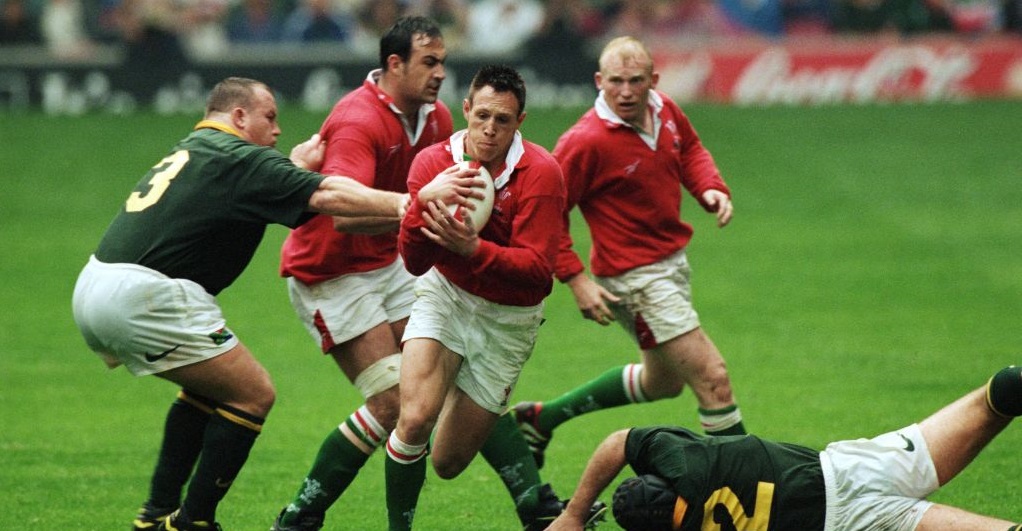The Wales team that beat South Africa in 1999: Where are they now?

The Millennium Stadium was still a building site in June 1999 on what turned out to be one of the best days in the modern history of Welsh Rugby.
Graham Henry’s side had just returned from Argentina after securing two hard-fought wins, but even the patriotic Wales fans could not have predicted what was about to unfold.
Wales had lost 12 of the previous 13 encounters with the Springboks, who were preparing to defend their World Cup crown. The only time they avoided defeat was a 6-6 draw in Cardiff in January 1970.
And only 12 months before, they had been humbled 96-13 at Loftus Versfeld in Pretoria in one of the darkest days Welsh rugby had known.
“I don’t think they laid the pitch until a couple of days before the game, so the final training session before was a bit makeshift.
“There was some overhanging girder work, and we had to wear the red helmets because there was a lot of work going on.
“It was quite a sight, and we had to wear them to the pitchside because the stadium was not finished.
“It was a good time for Wales. We had just come back from Argentina fresh from two hard-fought victories.
“It was the last game before the end of the season before the World Cup came to Cardiff, so it was a relaxed build-up.
“There were a lot of players who had been involved in the ill-fated 1998 tour to South Africa, so it was a great opportunity, and there was a lot of motivation.
“There was an incentive and belief in the camp, and we wanted to get a scalp against a southern hemisphere side,” hooker Garin Jenkins told the BBC on the 20th anniversary.
Fly-half Neil Jenkins kicked the first of his 19 points before Mark Taylor scored the first try at the new stadium, with Gareth Thomas adding a second after the break.
South Africa replied through tries from Percy Montgomery and Werner Swanepoel, while Braam Van Straaten kicked two penalties, with Gaffie du Toit adding another.
But nothing was going to stop Wales from celebrating the 29-19 victory, especially the builders who were seen throwing their hard hats in the air.
“It was such a beautiful June day, and it took about two hours to walk across the road to the post-match function through the crowds. It capped a fantastic day,” added Jenkins.
Wales:
Shane Howarth: All Blacks full-back who switched his allegiances was Worcester Warriors backs coach but now runs a Fresh Choice supermarket in Mangere Bridge, Auckland.
Gareth Thomas: A former Wales and Lions captain who became the first openly gay professional rugby player, has worked as a pundit and appeared on several reality shows.
Allan Bateman: A dual-code international went to work as an IT Specialist for the NHS in the Hematology Department of Princess of Wales Hospital in Bridgend.
Mark Taylor: Centre, who was appointed captain by Graham Henry, a motor company accountant, was appointed Performance Pathway Coordinator for the WRU in 2022.
Dafydd James: Former Lions centre is now working as a fitness and strength & conditioning coach as well as a motivational speaker and pundit.
Neil Jenkins: Lions fly-half who is the fifth highest international points scorer of all-time, has worked for the WRU as an assistant coach focusing on skills since retiring in 2004.
Rob Howley: Lions scrum-half was Wales backs coach until he was banned for betting in 2019 and, in December, was reappointed by the WRU as a technical coach.
Peter Rogers: Loosehead, who was born in Maidstone, Kent, ran a property and then a clothing business before retraining for a career in health and social care.
Garin Jenkins: At one time, Wales’s most capped hooker is a born-again Christain and has worked in a British Oxygen Gas & Gear shop in Port Talbot.
Dai Young: Lions tighthead and dual-code international has twice coached former club Cardiff and Wasps and is the head of rugby at Cardiff & Vale College’s Rugby Academy.
Craig Quinnell: Lock and brother of Scott, became managing director of the family water treatment business Albanyoak and has other business interests.
Chris Wyatt: Lock, who settled in Pertuis, South-West France, after finishing his career with USAP 84, runs a business transporting vehicles back to the United Kingdom.
Colin Charvis: The Lions’ back-rower had a spell coaching at The Dragons but now runs a flooring firm in Swansea, has also worked in the media and sat on the WRU Council.
Brett Sinkinson: New Zealand-born flanker who got caught up in the Grannygate eligibility scandal is now a landscape gardener in the Bay of Plenty.
Scott Quinnell: Wales and Lions No. 8 dual-code star has worked in the media for Sky Sport and as an after-dinner and motivational speaker.
Replacements:
Leigh Davies: Centre, who was an unused sub, has coached Cowbridge and Swansea University.
Stephen Jones: Lions fly-half clocked up more than a century of Wales caps, served as an assistant coach, and is now working with Moana Pasifika.
Dai Llewellyn: The scrum-half, who was Rob Howley’s backup, is now based in Cwmbran and works as a personal trainer and sports therapist.
Mike Voyle: Lock is now living on New Zealand’s Kapiti Coast, where he works as an estate agent and runs Voyle and Co Realty.
Ben Evans: A tight-head who coached in England, Jersey and Australia, where he lives in Sydney and is managing director of recruitment company Blue Bison Recruitment.
Andrew Lewis: Prop went to work for wealth management firm Brewin Dolphin and is now a Senior Investment Director for Investment Management Firm Brooks Macdonald.
Jon Humphreys: Hooker, a Cardiff legend, went into coaching and is now part of Warren Gatland’s coaching team as forwards coach, a role he has also held with Scotland.













































































